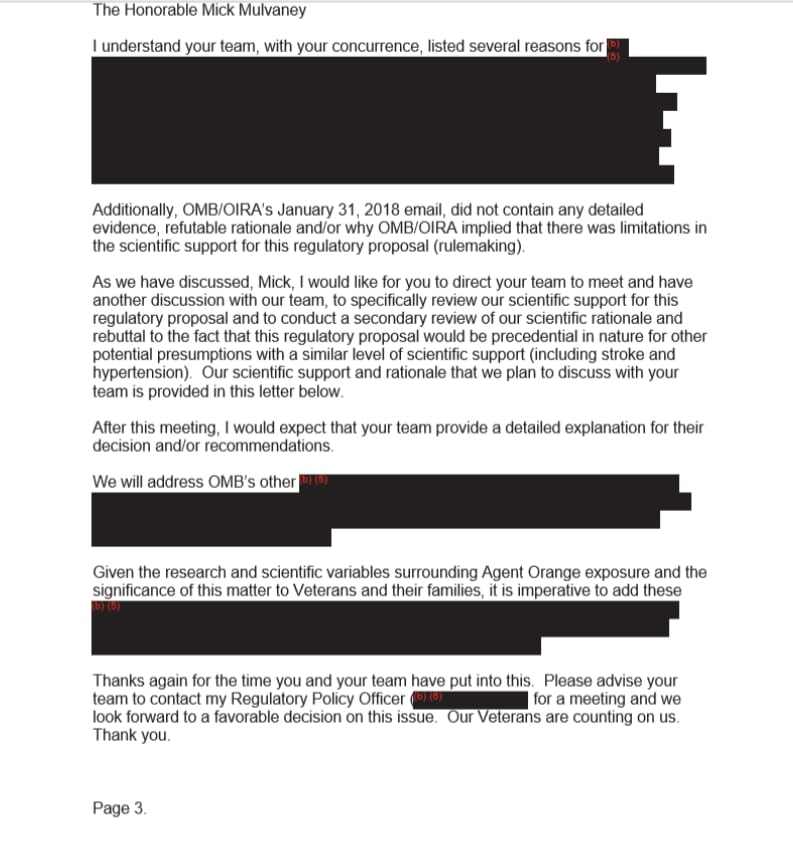Two years ago, then Veterans Affairs Secretary David Shulkin decided to add three health conditions to the list of diseases eligible for Agent Orange benefits, but White House officials challenged his authority and impeded enactment, according to internal documents obtained by a veteran through the Freedom of Information Act.
Now tens of thousands of veterans are still waiting.
Shulkin decided to add three health conditions — bladder cancer, Parkinson’s-like symptoms and hypothyroidism — to the list of diseases eligible for Agent Orange benefits. Heavily redacted emails and briefings released recently to former Army Spc. Jeff O’Malley, of Pearland, Texas, show Shulkin made the decision sometime before Oct. 3, 2017 — a move that would have given ailing veterans faster access to disability compensation and health benefits.
But the Office of Management and Budget, including Director Mick Mulvaney, and other White House officials objected, according to the documents.

While the specifics of OMB’s opposition were redacted, legible portions show that that the office believed the scientific evidence supporting the proposed additions was limited and it had concerns about the budgetary impact of the expansion, as well as any adverse effects on the existing disability benefits program.
According to the documents, roughly 83,000 veterans are afflicted with one of the three proposed presumptive conditions. The estimated cost for providing disability compensation to these former service members was redacted.
In 2016, scientists with the Institute of Medicine, now known as the National Academies of Sciences, Engineering and Medicine, found there was “limited or suggestive evidence” linking bladder cancer and hypothyroidism to Agent Orange exposure. That represented an upgrade from a previous recommendation that there was an inadequate or insufficient evidence to link the diseases to the toxic herbicides used as defoliants in Vietnam.
The 2016 IOM report also recommended that veterans with “Parkinson’s-like symptoms” — not just those diagnosed with Parkinson’s — be granted service-connected presumption.
The IOM report was released five months after a provision in the Agent Orange Act of 1991 expired — one that allowed the VA secretary to prescribe regulations for presumption of service connection for diseases, provided the medical and scientific evidence existed.
Knowing the provision had expired, Shulkin cited the VA’s general authority to support his decision, citing previous rulings by VA secretaries that awarded benefits for amyotrophic lateral sclerosis, or ALS, and osteoporosis for prisoners of war, even though the IOM said more evidence was needed or there was limited proof of any association.
Shulkin planned to issue a press release on Nov. 1, 2017 — and did — saying he had “made a decision” on the new presumptive conditions and would conduct a regulatory review.
But also that day, Mulvaney and Darin Selnick, who was then serving as veterans adviser on President Donald Trump’s Domestic Policy Council, met with Shulkin to discuss the press release and his authority to make the decision, which they questioned given that the Agent Orange Act of 1991 had expired.
RELATED

“We apparently have confusion around the Agent Orange presumptive,” Shulkin wrote in an internal email on Oct. 31. “We are going to have an urgent meeting … I need to understand what is the normal process in the past.”
Selnick, a former senior adviser for Concerned Veterans for America and a proponent of expanding private health care options for veterans, was considered a prominent influence in the Trump White House on veterans policy. He left his post on the Defense Policy Council to return as a senior adviser to then Acting VA Secretary Robert Wilkie.
Just days after Shulkin’s internal email, in a speech at the National Press Club in Washington, Shulkin said the regulation and rule-making process would begin “in a few short months.”
“I think it’s a matter of months, not anything longer than that,” Shulkin said.
Things appeared to progress smoothly: in the following weeks, VA’s director of Regulations Management and representatives from the Veterans Health Administration, Veterans Benefits Administration, and other offices met with officials from OMB Budget, the Office of Information and Regulatory Affairs, the Office of General Counsel and Selnick to discuss the rule-making process, and in emails, Shulkin described the meetings as “productive.”
But on Jan. 31, 2018, Shulkin received an email from OMB, which Shulkin said had the support of Mulvaney, that spelled out OMB’s objections and made new requests for additional evidence.
Shulkin responded to Mulvaney on March 8, 2018, urging him to support the decision.
“As we have discussed, Mick, I would like for you to direct your team to meet and have another discussion with our team, to specifically review our scientific support for this regulatory proposal … it is imperative to add these [redacted] … our veterans are counting on us,” Shulkin wrote.
It’s unclear whether Mulvaney replied, but Trump fired Shulkin 20 days later, amid reports that he spent lavishly and erroneously accepted tickets to Wimbledon during an official trip to Europe the previous year.
Trump later said Shulkin was dismissed because he didn’t agree with the White House’s efforts to expand care for veterans in the private sector.
For many veterans living with one of the three conditions, as well as those with hypertension, which was linked to Agent Orange by the National Academies of Sciences, Engineering and Medicine last November, the wait has been frustrating and financially burdensome.
“The VA seems to drag their feet on these types of issues in hopes we'll all die out before they make a decision,” retired Army Sgt. Major John Mennitto wrote Military Times.
“I was in Vietnam from 1968 to 1969 and now have bladder cancer. The VA doesn’t want to hear about it,” said Hawthorne, California, resident and Navy veteran John Murray, who repaired river patrol boats in Vinh Long.
In November, the NASEM ruled “sufficient evidence" existed for hypertension, more commonly known as high blood pressure, being linked to Agent Orange. Previously, the scientific body had suggested there was only “limited or suggestive evidence” to link it to the herbicide.
The condition was discussed between Shulkin and OMB in the same documents as the other three presumptive illnesses, but the former VA secretary’s opinion on whether it should be included was blacked out.
More than 300,000 Vietnam veterans enrolled in VA health care have high blood pressure, which also is an age-related condition. VA officials have previously stated that it would be a challenge to determine who has high blood pressure as a result of exposure to Agent Orange or whether it simply is a factor of their age.
Veterans continue to wait for a decision on the proposed presumptive conditions and lawmakers and veterans advocates alike have pressed VA for answers.
Earlier this year, Veterans Health Administration executive in charge Dr. Richard Stone told Congress he hoped to release a decision on new Agent Orange presumptive conditions would be announced within 90 days. That was in March.
During an interview on Sept. 17, VA Secretary Robert Wilkie said a decision would be forthcoming, but he declined to say when or what the decision was.
On Sept. 25, Dr. Patricia Hastings, VA’s chief consultant for post-deployment health told the Senate Veterans Affairs Committee that “those [presumptives] are still with leadership in coordination for the decisions to be made.”
According a briefing delivered in May 2018 to the new acting secretary, Wilkie, the department is waiting for the results of two studies — the VHA’s Vietnam Veteran Morbidity Study and the Vietnam Mortality Study — before “re-engaging OMB on prescribing presumptions.”
Both studies were scheduled to be completed this year, but the results have not been released. In a proposed statement drafted by VA but never released, officials said VA and the administration determined in “late March (2018) that there is insufficient data and information to overcome the limitations in the scientific support for the rulemaking.”
“These two studies could produce additional scientific insights into an association between exposure to Agent Orange and stroke, hypertension, hypothyroidism, Parkinson’s disease and bladder cancer,” the statement noted. “VA is committed to working closely with the administration on the exploration of any new evidence or information that would provide the sufficient scientific support for potential new presumptions.”
In his letter to Mulvaney, Shulkin said VA provided OMB with more than 40 scientific studies, peer-reviewed studies and other documents supporting his regulatory proposal. He also noted in private messages to subordinates that he feared the department would not be able to obtain additional “sufficient scientific evidence to support any future presumptions that OMB agrees to.”
“We may need to consider other options as well. Congress is adding AO presumptions to the Blue Water Navy House bill,” he wrote.
RELATED

The delay in the regulatory process for the new presumptive diseases coincided with a fight between Congress and VA to award benefits for veterans who served on U.S. Navy ships off the coast of Vietnam; the issues surrounding the “Blue Water Navy” veterans also were discussed in length in the documents and showed the VA, under Shulkin, planned to pursue extending benefits to ill veterans who had served on Navy vessels that entered bays and harbors bordering the country.
Ultimately, Congress passed a law this June extending disability benefits to veterans with an Agent Orange related diseases who served on Navy ships within a 12-mile mapped range of the coast. The VA will begin processing claims applications for blue water Navy veterans beginning Jan. 1.
In an interview with Military Times last week, Shulkin declined to call the holdup on the presumptives “political interference.”
Instead, he said the process for adding new conditions is backwards.
“I think we have the obligation to support our veterans first and then, if it takes a while to look at the data, or the data shows something else, then we need to make changes in the policy. But the current policy makes our veterans wait,” said Shulkin, who has recently released a book detailing his three years working for VA, “It Shouldn’t Be This Hard to Serve Your Country.”
Vietnam veteran O’Malley, who has uncontrolled hypertension, said he can’t help interpreting the back-and-forth in the documents as anything but political maneuvering.
“What they really want to say is ‘we’re not approving anything, we are not going to spend an extra penny on Agent Orange than we have to,’” O’Malley said. “They have figured out every possible way of delaying … I don’t believe Secretary Wilkie would intentionally shut down benefits for veterans, but I do believe Mr. Mulvaney would shut down any process that would add a penny to the budget.”
“Dr. Shulkin wanted to do this and the White House didn’t. The longer they delay, the fewer veterans they will have to provide benefits for,” O’Malley said.
Military Times Deputy Editor Leo Shane contributed to this report.
Patricia Kime is a senior writer covering military and veterans health care, medicine and personnel issues.




